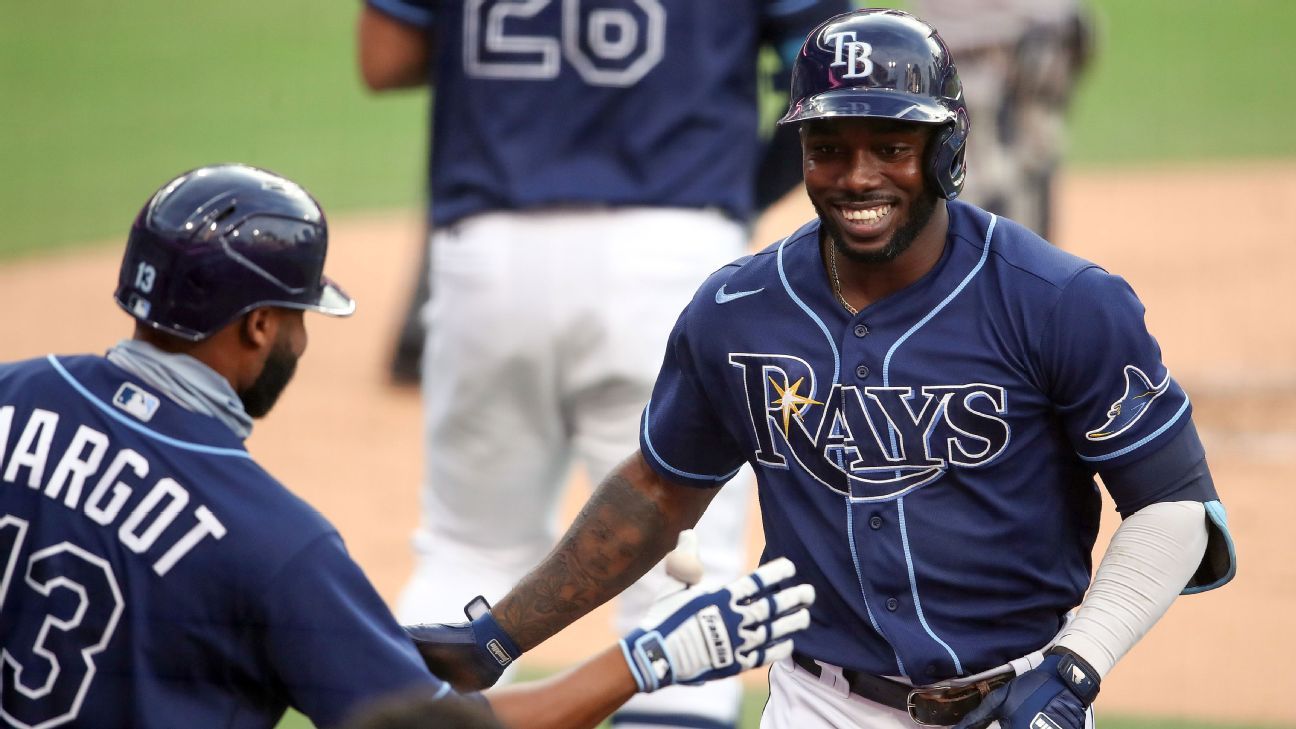We’ve gotten used to seeing the Houston Astros in the American League Championship Series. The Tampa Bay Rays? Not so much.
The Astros bashed their way into their fourth consecutive ALCS, the longest streak since the 1998-2001 Yankees. Houston scored 33 runs and hit 12 home runs in its four-game division series win over the Oakland Athletics. Carlos Correa has led the resurgent Astros offense this postseason, with four homers, 12 RBIs, a .500 average and 1.715 OPS in six games.
The Rays are making the second ALCS appearance in franchise history; they beat the Red Sox in seven games in 2008 before losing to the Phillies in the World Series. The AL’s top seed, the Rays are solid in all facets of the game with a surprisingly deep lineup, steady starting pitchers and raft of power arms in the bullpen.
The odds say …
The Rays have a 63.3% chance of winning the series. (Projections from ESPN’s Bradford Doolittle.)
How they got here

Rays: Powered by a dominant pitching staff that features three potential aces in Blake Snell, Charlie Morton and Tyler Glasnow, Tampa Bay ran away with the AL East race and edged out Oakland for the league’s best mark. Brandon Lowe was the only true offensive standout in a lineup that finished 12th in the majors with 289 runs scored and produced a team OPS of .753.
Wild-card series: Defeated Toronto 2-0
AL Division Series: Defeated New York 3-2

Astros: Despite finishing the regular season with a 29-31 record, the Astros earned an automatic playoff berth by finishing second in the American League West. Brought down by injuries during the year, the offense finished 14th in the majors with 279 runs scored and the pitching staff had MLB’s 13th-best ERA at 4.31.
Wild-card series: Defeated Minnesota 2-0
AL Division Series: Defeated Oakland 3-1
Series schedule
at San Diego
Game 1: Sunday, Oct. 11, TBS
Game 2: Monday, Oct. 12, TBS
Game 3: Tuesday, Oct. 13, TBS
Game 4: Wednesday, Oct. 14, TBS
Game 5: Thursday, Oct. 15, TBS (if necessary)
Game 6: Friday, Oct. 16, TBS (if necessary)
Game 7: Saturday, Oct. 17, TBS (if necessary)
Three reasons the Rays will win the series
1. They’ve been the best team in the American League all season
The Rays went 40-20, dominated the Blue Jays and edged past the tough Yankees. Maybe they don’t have any superstars, but their 28-man roster is the deepest in the AL, and that becomes even more important in a seven-game series with no off days than it was in the first two rounds. They have five quality starting pitchers if they use all five (rookie Josh Fleming is the No. 5 starter and he went 5-0 with a 2.78 ERA). A week ago, nobody had heard of Pete Fairbanks and he comes out of the bullpen firing 100 mph lasers at the top of the strike zone. A week ago, nobody had heard of Randy Arozarena and now he’s one of the stars of October.
Most important, this is a team that knows it can win. It buys into all the quirky aspects the Rays deploy like the opener or the four-man defensive alignment in the outfield or all the platoons. They take a certain pride in being the Little Engine That Could. They’re a good defensive team, they can hit home runs and they can even surprise you with a stolen base.
2. Randy Arozarena, best player on the planet
Speaking of the rookie outfielder, if we were to nitpick the Rays, it would be that no single player in the lineup really scares you. Brandon Lowe was the best hitter in the regular season and is certainly underrated, with a .269/.362/.554 line and 14 home runs, but he’s also a streaky, strikeout-prone guy and he has been slumping. Enter Arozarena, acquired from the Cardinals in the offseason. The 25-year-old Cuban tested positive for COVID-19, so he didn’t play until Aug. 30. He then hit seven home runs in September in 59 at-bats and three more against the Yankees. Right now, you can’t get a fastball by him: Indeed, nine of his 10 home runs have come against fastballs (seven) or sinkers (two).
3. They match up with the Astros
With a lineup that features only three lefties in Michael Brantley, Kyle Tucker and Josh Reddick, the Astros batted with the platoon advantage just 43.2% of the time in the regular season, the lowest in the majors. Yes, three of the five Tampa Bay starters are lefties (Snell, Ryan Yarbrough and Fleming), but the Rays have a plethora of power righties to go after all those right-handed Houston batters. Including the playoffs, righties hit .197 off Glasnow, but look at the bullpen numbers: .114 vs. Nick Anderson, .159 vs. Diego Castillo, .208 vs. Aaron Slegers, .224 vs. Fairbanks, .252 vs. John Curtiss. Sidearmer Ryan Thompson was actually the least effective of the group, allowing a .276 average, but has been trusted in high-leverage situations in the postseason (and could serve as an opener in the Yarbrough and/or Fleming games). And then on offense, the Rays can go with their right-handed lineup against Framber Valdez and their left-handed lineup against righty starters, with guys available off the bench to counteract Dusty Baker’s bullpen moves.
Three reasons the Astros will win the series
1. The offense is back
The 2019 Astros, according to the advanced metric weighted runs created (adjusted for park and era), had the second-best offense of all time, behind only the famous 1927 Yankees. In 2020, the Astros ranked 17th … in the majors. It was quite a fall, with many possible explanations, but the Astros crushed a very good Oakland pitching staff over four games in the division series, hitting .332/.388/.594 with 12 home runs. Carlos Correa has been locked in, with four home runs and 12 RBIs in six playoff games, but maybe the best sign is Jose Altuve (two home runs, .429 OBP) has looked much better after a miserable regular season.
Four games don’t necessarily mean the Astros have suddenly turned everything around, but this sure resembled the lineup we saw in 2019 (minus the injured Yordan Alvarez). Keep this in mind as well: Even as they struggled at times in the regular season, the Astros had the lowest strikeout rate in the majors. You have to earn your outs against Houston.
“This is just our normal offense,” Kyle Tucker said after beating the A’s. “We didn’t show this too much during the season, but this lineup can do this every night. This lineup 1 through 9 can produce at any moment and we were doing that this entire series.”
2. Framber Valdez is pitching like an ace
The 26-year-old lefty debuted in the majors in 2018 and had been an interesting prospect, but over 100 innings in the majors in 2018 and 2019, mostly pitching in relief, he struggled to command the strike zone, averaging 5.7 walks per nine innings and posting a 4.60 ERA. He quietly had a very good regular season, going 5-3 with a 3.57 ERA, just 2.0 walks per nine, and an even better 2.85 FIP. In two playoff outings — a five-inning shutdown relief appearance against the Twins and a Game 1 victory over the A’s — he has given up two runs and seven hits over 12 innings.
Valdez’s curveball is his best pitch, as batters hit .124 against it in the regular season and .111 so far in the postseason, and he’ll throw it in any count. He did give up two home runs in his start against the A’s, but even though he gives up a lot of hard contact, it’s usually on the ground, with a 60% ground ball rate. He’s good, and right now he’s pitching with a high level of confidence.
3. Enoli Paredes, the pop-up reliever
It seems every postseason, the eventual World Series champion has somebody who rises up in October and becomes a huge part of the bullpen. For the Nationals last year, it was veteran Daniel Hudson, acquired in a trade, who had four saves and got the final three outs of Game 7 of the World Series. For the Red Sox in 2018, it was Joe Kelly, who had a 4.39 ERA in the regular season then was lights out in the postseason, including six scoreless innings in the World Series. For the Astros, it just might be the rookie Paredes, who tossed three perfect innings over two outings against the A’s.
The Houston bullpen had some issues, especially early in the season when at times it had nine rookie relievers. Even now, the depth is certainly questionable. Up steps Paredes, who had a 3.05 ERA in 20⅔ innings, but gave up only one home run, relying primarily on a 96 mph fastball and a slider (he threw his fastball 76% of the time over his two outings against Oakland). Paredes pitched in Class A and Double-A last year, giving up only 50 hits in 94 innings with 128 strikeouts, so there is some big stuff here. With the potential of having seven games in seven days, Dusty Baker won’t necessarily be able to use his starters in relief the way he did the first two rounds, so look for Paredes to get a lot of the key innings in the middle of close games.
